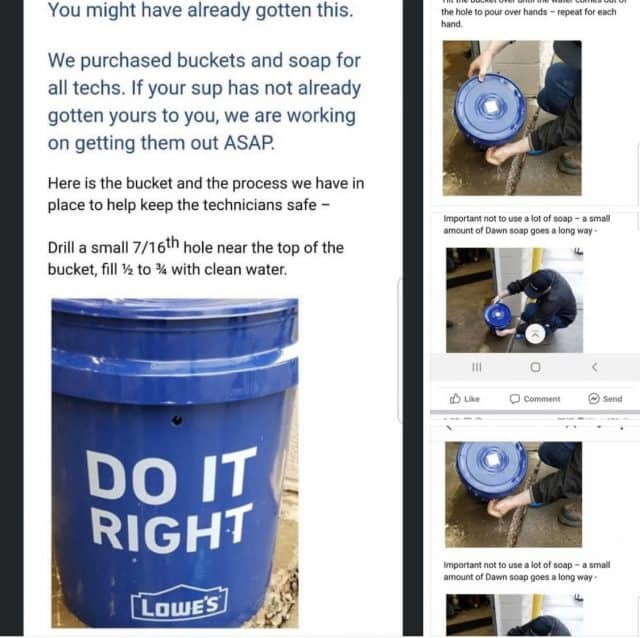
Improvising hand sanitizer, with a bucket, water, and Dawn dishwashing detergent.
Letting a cable technician into your home may expose you, your family, or the technician to the COVID-19 coronavirus, according to multiple reports of people catching the virus during service calls.
Technicians have complained for weeks about inadequate protection for workers that visit customer homes. Several told Stop the Cap! they lack a steady supply of gloves, face masks, and hand sanitizer, and one noted they were forced to improvise with plastic buckets obtained from Lowe’s filled with dishwasher soap and water.
“Every service call is risky these days,” said Ralph, a Spectrum technician serving a city in Upstate New York. “You have no idea what you will run into. For the first week we honestly were not too concerned because the number of customers testing positive outside of New York City was not too high, but we’ve traded stories about coughing customers and those still in bed (obviously ill) as we work around them in bedrooms.”
Ralph says Spectrum pre-screens customers with questions if they have to set up a service call, but customers are obviously not always being honest.
“If my internet and TV was out and I was stuck at home, I guess I can understand why some people are desperate to get their service fixed,” Ralph told us. “They deduced that if they admitted they were self-quarantined or ill, we wouldn’t send anybody out, so they sometimes lie.”
The company has seen an uptick in service calls as people take advantage of Spectrum’s offer of free internet service for students, which has resulted in a number of new customers.
 “One lady coughed repeatedly at me as she tried to move some of her personal property out of the way so I could drill a hole to bring in a cable line,” Ralph said. “She started turning blue and her husband had to help her to a chair. I couldn’t get back to my truck fast enough that morning. I have a wife and three kids and the last thing I need to do is bring this virus back to them.”
“One lady coughed repeatedly at me as she tried to move some of her personal property out of the way so I could drill a hole to bring in a cable line,” Ralph said. “She started turning blue and her husband had to help her to a chair. I couldn’t get back to my truck fast enough that morning. I have a wife and three kids and the last thing I need to do is bring this virus back to them.”
Pleas for more personal safety equipment have met with shrugs.
“My supervisor said we are on our own until the company comes through, or we could buy our own supplies,” Ralph said. “The PR from this company is frankly bullshit. We are expected to show up and do the work without complaining. I need the job so I keep my fingers crossed I don’t get the virus.”
Another technician anonymously shared his own experiences on Reddit:
I am a field tech currently going through self quarantine for exposure to COVID-19.
I was in a customer’s home working when they handed me a mask. I asked multiple times if them or anyone in the house was sick as for my safety. They responded “I am healthy” every single time. I needed into the Master Bedroom Closet to look at the smart panel. Customer wouldn’t let me in there. I figured someone was sleeping or it was a mess (happens to us frequently).
I finally said, “I need in there to do the free internet install you ordered, either that or we can reschedule for a time someone can go in there.” It turns out her husband was in quarantine because he wasn’t feeling well for a few weeks. I instantly walked outside and called my supervisor and was told “harm was already done and to finish the job.”
I’ve been home with a 100°F+ fever coughing and wheezing for the past week and [today] got a call stating that the customer called in to inform a confirmed case and to notify the tech (me) about the possible exposure. I was there last Monday and continued to work until that Thursday and have possibly contaminated multiple other families. I haven’t been to work since last Thursday but am told without an official test I have to return Sunday. But also, I am being told by my primary care doctor that they need a fever of over 10 days to request a test.
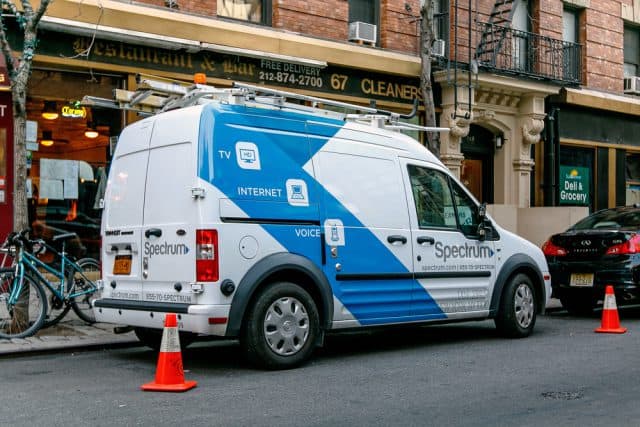 Spectrum technicians are being offered a weekly $25 restaurant gift card if they agree to brave service calls in customer homes.
Spectrum technicians are being offered a weekly $25 restaurant gift card if they agree to brave service calls in customer homes.
“It’s really insulting,” said Ralph. “The bosses who came up with this wouldn’t do it for a gift card and frankly $25 off at Olive Garden isn’t going to do me any good if I am in the ICU or dead.”
In North Carolina, a Spectrum technician may have introduced the virus into a Charlotte family’s home during a service call, with dangerous results.
Emily Beaty’s twins were born 26 weeks premature, so she was extremely concerned about admitting strangers into her home. Unfortunately, her internet service was not working well, and fixing it meant a service call.
Beaty told WSOC-TV she carefully went over the steps Spectrum was taking to protect customers from the coronavirus.
“They were taking this situation very seriously,” Beaty was told. “They were prescreening their employees and all of their employees were healthy,” the Spectrum representative claimed.
The technician spent most of the service call working outside, but stepped inside briefly to test his repairs. Four days later, Spectrum called to inform her the technician had just tested positive for the coronavirus. Now the family is in voluntary quarantine.
“I just don’t feel like they were doing a proper screening,” Beaty told the TV station. “I mean, they sent a tech out to my house that had a cough and not two days later, he is being tested for coronavirus.”
Spectrum responded in a statement:
“We have confirmed that one of our Charlotte-based technicians has tested positive for COVID-19. We immediately contacted the customers recently served by this technician, as well as the technician’s co-workers.
“We learned this technician was not feeling well on March 25 (Wednesday) and sent the technician home immediately. The technician sought medical attention and was subsequently tested. When we confirmed the positive test on March 27 (Friday), we began contacting customers served by this technician and co-workers.
“We are continually communicating and educating our staff on best practices according to the CDC health and safety guidelines, such as proper hygiene and social distancing. We are encouraging all technicians to take their temperature at home before reporting for work. We have made clear, including in a message directly from our chairman and CEO to all employees that any employee who is sick, or who is caring for someone who is sick, should stay home.
If an employee needs to self-quarantine, they will not need to use their paid sick leave, but will continue to be paid and receive full benefits while under quarantine. The company also has given every worker an additional 15 days of COVID-19-related paid time off, and hourly workers who do not use this time during the COVID-19 pandemic will be paid out the remaining unused days at the end of the year.”
WSOC-TV in Charlotte reports on one family that was exposed to the coronavirus by a Spectrum technician during a service call. (3:01)
 Get ready for another huge streaming platform, America. HBO Max from AT&T’s WarnerMedia is scheduled to debut Wednesday, May 27th with over 10,000 of content encompassing the libraries of HBO, Adult Swim, Cartoon Network, Crunchyroll, CNN, Looney Tunes, Rooster Teeth, TBS, TNT, truTV, and Turner Classic Movies.
Get ready for another huge streaming platform, America. HBO Max from AT&T’s WarnerMedia is scheduled to debut Wednesday, May 27th with over 10,000 of content encompassing the libraries of HBO, Adult Swim, Cartoon Network, Crunchyroll, CNN, Looney Tunes, Rooster Teeth, TBS, TNT, truTV, and Turner Classic Movies.

 Subscribe
Subscribe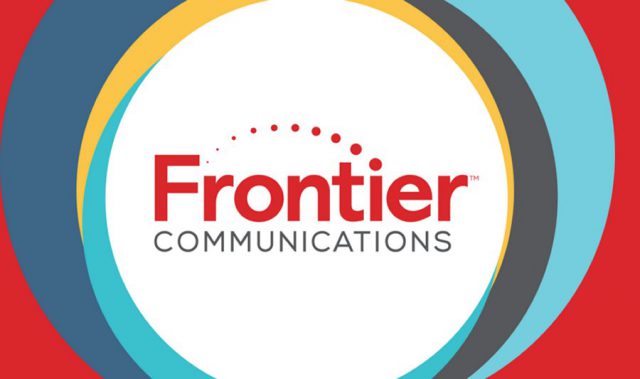 Frontier Communications filed for bankruptcy reorganization protection this week with more than $10 billion in debts and departing customers, despite retention efforts that cost the company more than $5 million a month.
Frontier Communications filed for bankruptcy reorganization protection this week with more than $10 billion in debts and departing customers, despite retention efforts that cost the company more than $5 million a month.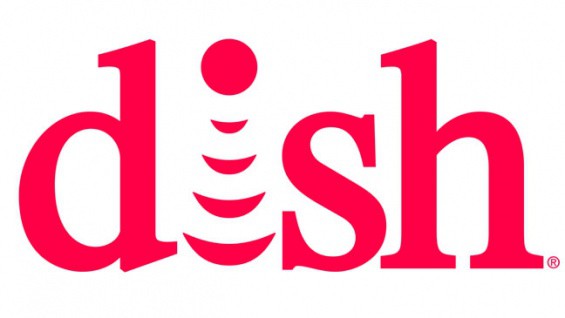 The merger of T-Mobile and Sprint would
The merger of T-Mobile and Sprint would  Ergen’s commitment to build a new fourth national wireless carrier was crucial for T-Mobile and Sprint to win regulatory approval of their $26 billion merger, which will reduce the number of national wireless competitors to three. That merger secretly received help from the country’s chief antitrust enforcer, Makan Delrahim. The Trump-appointed regulator, who serves as the head of the Justice Department’s antitrust division, exchanged numerous text messages between himself and top executives of Sprint, T-Mobile, and Dish to help salvage a merger deal under heavy criticism from Democrats and consumer advocates. Delrahim signaled his approval of the merger if Dish promised to buy Sprint’s prepaid wireless brand Boost and was offered access to T-Mobile’s wireless network to help launch Dish Wireless as a new competitor. But executives from Sprint and T-Mobile repeatedly quarreled over the details of the merger with Ergen, forcing Delrahim to intervene and bring the parties together to smooth things over.
Ergen’s commitment to build a new fourth national wireless carrier was crucial for T-Mobile and Sprint to win regulatory approval of their $26 billion merger, which will reduce the number of national wireless competitors to three. That merger secretly received help from the country’s chief antitrust enforcer, Makan Delrahim. The Trump-appointed regulator, who serves as the head of the Justice Department’s antitrust division, exchanged numerous text messages between himself and top executives of Sprint, T-Mobile, and Dish to help salvage a merger deal under heavy criticism from Democrats and consumer advocates. Delrahim signaled his approval of the merger if Dish promised to buy Sprint’s prepaid wireless brand Boost and was offered access to T-Mobile’s wireless network to help launch Dish Wireless as a new competitor. But executives from Sprint and T-Mobile repeatedly quarreled over the details of the merger with Ergen, forcing Delrahim to intervene and bring the parties together to smooth things over.
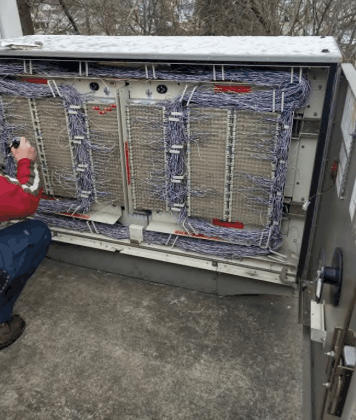


 “One lady coughed repeatedly at me as she tried to move some of her personal property out of the way so I could drill a hole to bring in a cable line,” Ralph said. “She started turning blue and her husband had to help her to a chair. I couldn’t get back to my truck fast enough that morning. I have a wife and three kids and the last thing I need to do is bring this virus back to them.”
“One lady coughed repeatedly at me as she tried to move some of her personal property out of the way so I could drill a hole to bring in a cable line,” Ralph said. “She started turning blue and her husband had to help her to a chair. I couldn’t get back to my truck fast enough that morning. I have a wife and three kids and the last thing I need to do is bring this virus back to them.” Spectrum technicians are being offered a weekly $25 restaurant gift card if they agree to brave service calls in customer homes.
Spectrum technicians are being offered a weekly $25 restaurant gift card if they agree to brave service calls in customer homes.